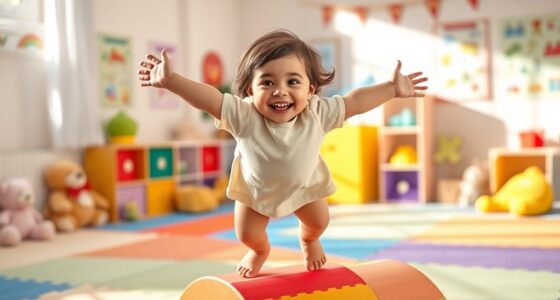In your baby’s first three months, they start to see more clearly, focusing on faces and bright objects. They’ll begin tracking moving things and recognizing familiar voices and faces. Your little one learns to connect with you through smiles, coos, and facial expressions. These early social and emotional milestones help them feel secure and build bonds. Keep caring and engaging—there’s much more about how they grow during these crucial months.
Key Takeaways
- Babies develop the ability to focus on faces and contrast objects within 8-12 inches.
- They start tracking moving objects and recognizing familiar voices and faces.
- Social skills emerge as babies respond with smiles, coos, and facial expressions.
- They begin to connect through early gestures and respond to interactions with increased awareness.
- Visual and social milestones lay the foundation for future cognitive and emotional development.

During the first three months, your baby undergoes rapid growth and development, laying the foundation for future skills. This is a time when you’ll notice remarkable changes in how your little one perceives and interacts with the world around them. One of the key areas of development during this period is their vision. In these early weeks, your baby’s vision milestones involve gradually improving focus and eye coordination. Initially, they can see only about 8 to 12 inches away, which is perfect for gazing at your face during feedings. Over time, their eyes start working together more effectively, allowing them to track moving objects and recognize familiar faces. You might see them turn their head toward a toy or follow your movements with their eyes. These visual advances are essential because they lay the groundwork for later skills like hand-eye coordination and object recognition. Regular monitoring of market trends can help parents understand the importance of visual development milestones.
Alongside visual progress, your baby begins to develop social interactions. Although they can’t communicate with words yet, they are learning to connect with you through facial expressions, sounds, and gestures. During this stage, your baby will start to recognize your voice and may respond with a smile or a coo when they see you. These early social cues are fundamental because they encourage bonding and help your baby understand that they are part of a relationship. Your responsive reactions, like talking to them or making silly faces, reinforce their sense of security and trust. As they become more aware of their surroundings, they might also show preferences for certain people or objects, which signals their growing social awareness. Understanding early social cues can further enhance your interactions and support their emotional development.
Throughout this period, your baby is also sharpening their ability to focus, which is intertwined with their visual and social milestones. For instance, they might fixate on bright or contrasting objects, and this focus helps strengthen their attention span. This is also when they start to recognize familiar faces and voices, which promotes social bonding and emotional comfort. Your baby’s increasing awareness of their environment and your interactions fuels their curiosity and desire to explore. You’ll notice that their responses become more intentional, even if they are still primarily reflexive. These early social interactions set the stage for more complex communication and relationship-building skills in the months to come. By supporting their visual and social development now, you help your baby build the confidence and skills they need to thrive as they continue to grow.
Frequently Asked Questions
When Should I Start Tummy Time With My Newborn?
You should start tummy time with your newborn as soon as they’re comfortable, ideally within the first week. Tummy time benefits include strengthening neck, shoulder, and back muscles, which are essential for developing your baby’s motor skills. Keep sessions short and supervised, gradually increasing the duration as your baby gets stronger. Regular tummy time helps prevent flat spots and encourages your baby to explore their environment confidently.
How Can I Tell if My Baby Is Reaching Developmental Milestones?
You might wonder if your baby is on track, and the signs are more exciting than you think. Watch for milestones like steady head control, reaching and grasping objects, and babbling sounds—these signal motor skill development and early language milestones. Keep a close eye on their curiosity, responses, and coordination. If things seem delayed, consult your pediatrician, but remember, every baby develops at their own pace.
Are There Specific Toys That Promote Early Learning?
Yes, you can choose educational toys that promote early learning through sensory play. Look for toys with bright colors, varied textures, and different sounds, as these help stimulate your baby’s senses. Toys like soft blocks, rattles, and textured books encourage exploration and development. By engaging with these sensory-rich educational toys, your baby can improve fine motor skills, problem-solving, and sensory awareness, laying a strong foundation for future learning.
How Much Sleep Does a 2-Month-Old Typically Need?
Think of your 2-month-old’s sleep patterns as a gentle tide, ebbing and flowing unpredictably. They typically need about 14 to 17 hours of sleep in a 24-hour period. Establishing consistent nap routines helps create a safe harbor amid the waves of sleep. Your little one’s sleep may include several naps during the day and longer stretches at night, gradually settling into a more predictable pattern as they grow.
What Are Signs of Developmental Delays in Infants?
If you notice your infant isn’t meeting milestones like smiling, babbling, or holding their head up, it could be a sign of developmental delays. You should consider a developmental screening to identify concerns early. Early intervention is essential; it can help address issues promptly and support your baby’s growth. Trust your instincts and consult your pediatrician if you have any worries about your baby’s development.
Conclusion
As you watch your little one grow during these first few months, you might think you’ve seen it all. But believe me, the most surprising milestones are just around the corner, waiting to unfold. What they learn next could change everything—for both of you. Stay tuned, because these early days are only the beginning of a remarkable journey filled with discoveries, surprises, and moments you’ll never forget. The adventure has only just begun.









